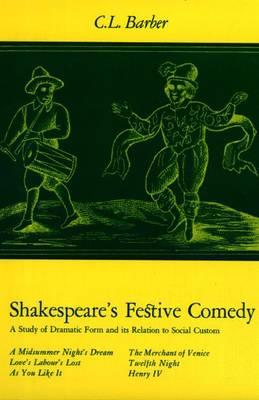Overview
'Shakespeare's Festive Comedy' is the best book on the subject that I know. The book is well and clearly written, and I should think would fascinate the general readers. I think it is indispensable for students of Shakespeare's comedy.'-----Francis Fergusson
Full Product Details
Author: Cesar Lombardi Barber
Publisher: Princeton University Press
Imprint: Princeton University Press
Edition: 2nd Revised edition
Dimensions:
Width: 12.70cm
, Height: 1.60cm
, Length: 20.30cm
Weight: 0.307kg
ISBN: 9780691013046
ISBN 10: 0691013047
Pages: 266
Publication Date: 21 July 1972
Audience:
Professional and scholarly
,
College/higher education
,
Professional & Vocational
,
Tertiary & Higher Education
Replaced By: 9780691149523
Format: Paperback
Publisher's Status: Out of Print
Availability: Out of print, replaced by POD

We will order this item for you from a manufatured on demand supplier.
Language: English
Reviews
Shakespeare's Festive Comedy is the best book on the subject that I know. The book is well and clearly written, and I should think would fascinate the general readers. I think it is indispensable for students of Shakespeare's comedy. -Francis Fergusson C. L. Barber is the most compelling of the anthropological critics and his book, Shakespeare's Festive Comedy, is to my mind far and away the most illuminating yet to appear on its subject. He is compelling for many reasons-a mind both intricate and deft, a sensitivity quick to the accommodation of esthetic form to the intricacies of psychological function, a humanity benignly tolerant and inclusive. . . . The especial merit of Barber's criticism lies in its sensitive exploration of the individual working out of the release-clarification formula in five separate plays. Each, he discovers, 'tends to focus on a particular kind of folly that is released along with love-witty masquerade in Love's Labour's Lost, delusive fantasy in A Midsummer Night's Dream, romance in As You Like It, and in The Merchant of Venice, prodigality balanced against usuary.' Twelfth Night, to complete the list, focuses on misrule and its complementary folly of time-serving. -Arthur M. Eastman, in A Short History of Shakespearean Criticism
C. L. Barber is the most compelling of the anthropological critics and his book, Shakespeare's Festive Comedy, is to my mind far and away the most illuminating yet to appear on its subject. He is compelling for many reasons-a mind both intricate and deft, a sensitivity quick to the accommodation of esthetic form to the intricacies of psychological function, a humanity benignly tolerant and inclusive. . . . The especial merit of Barber's criticism lies in its sensitive exploration of the individual working out of the release-clarification formula in five separate plays. Each, he discovers, 'tends to focus on a particular kind of folly that is released along with love-witty masquerade in Love's Labour's Lost, delusive fantasy in A Midsummer Night's Dream, romance in As You Like It, and in The Merchant of Venice, prodigality balanced against usuary.' Twelfth Night, to complete the list, focuses on misrule and its complementary folly of time-serving. -Arthur M. Eastman, in A Short History of Shakespearean Criticism Shakespeare's Festive Comedy is the best book on the subject that I know. The book is well and clearly written, and I should think would fascinate the general readers. I think it is indispensable for students of Shakespeare's comedy. -Francis Fergusson




